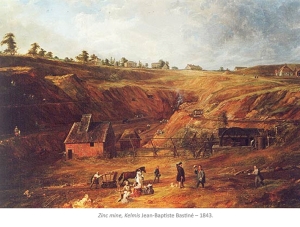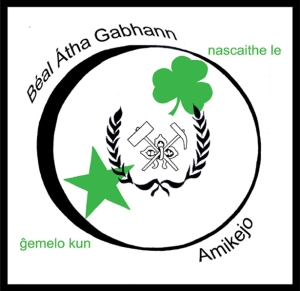Ballygowan, on the edge of Silvermines village, has been mined for centuries. The last great bout of mining took place in the 19th C, although lead and silver had long been exhausted. Zinc and zinc-oxide, or calamine, were extracted from the remaining ore. Calamine gets its name from the town of Kelmis in present day Belgium; the mine works there were known as Vielle Montagne (French) or Altenberg (German). Following the Congress of Vienna in 1815, both Prussia and the Netherlands were keen to have this valuable resource included in their territory.
As a compromise, the mine and the town of Kelmis became a neutral territory, jointly administered by the two nations. The newly established territory Neutral Moresnet had a more or less triangular shape, occupying approx. 3.5 square km. In 1859 it was granted a greater measure of self-administration when a mayor and council were installed. The zinc mine was the major employer in Neutral Moresnet and population of the territory averaged 3,000.
When the mine was exhausted in 1885 doubts arose about the continued survival of the territory. A casino was established which did very well after gambling was outlawed in Belgium. The territory also had three distilleries for the manufacture of gin.
In 1908, Dr. Wilhelm Molly proposed making Neutral Moresnet the world’s first Esperanto speaking state, named Amikejo (place of friendship). A number of Kelmis residents learned Esperanto and in 1908 a great propaganda demonstration for the Esperanto state Amikejo was held in the pavilion of the shooting association. This self-declared Esperanto republic lasted until WWI when the Germans invaded Belgium in 1914. Following the Treaty of Versailles the territory of Neutral Moresnet was awarded to Belgium.
Source/ www.moresnet.nl. Text and image reproduced by kind permission of Cees Damen.
Artwork/ Fiona Woods
02/Front
A painting of the zinc mine in Kelmis by Jean-Baptiste Bastiné, 1843.

02/Back
A logo for an imaginary twinning between Béal Atha Gabhann (Ballygowan) and Amikejo, the world’s first and only Esperanto state. Text in Irish and Esperanto.
